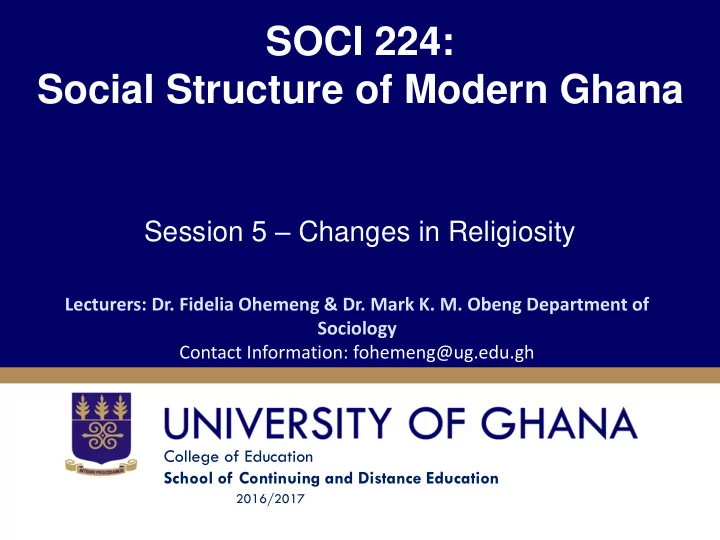

SOCI 224: Social Structure of Modern Ghana Session 5 – Changes in Religiosity Lecturers: Dr. Fidelia Ohemeng & Dr. Mark K. M. Obeng Department of Sociology Contact Information: fohemeng@ug.edu.gh College of Education School of Continuing and Distance Education 2016/2017
Session Overview • Religion plays an important role in the lives of Ghanaians. This section examines the changes that have occurred in traditional Ghanaian religiosity. Two main sources of change: Christianity and Islam are discussed. The implications of Christianity and Islam are also discussed. Slide 2
Session Outline The key topics to be covered in the session are as follows: • Topic One: origins of Christianity • Topic Two: the impact on the Ghanaian society • Topic Three: the origins of Islam and its impact Slide 3
Reading List • Abotchie, C. (2014). Social Change in Ghana. Accra: Hans Publications. Chapter 4 • Nukunya, G. (2014). Tradition and Change in Ghana: an Introduction to Sociology. Accra: Ghana Universities Press. Pages 141-155 Slide 4
Topic One THE ORIGINS OF CHRISTIANITY Slide 5
DEFINITION • Religion is a means to ward off evil spirits (Assimeng, 1981) • The search of security / unexplainable causes of misfortune • The propitiation or conciliation of powers superior to man believed to control the cause of nature and human life • Beliefs and practices associated with the supernatural (Nukunya, 2014:63) • Durkheim (1959: 47) “ a unified system of beliefs and practices relative to sacred things, that is to say, things set apart and forbidden – beliefs and practices which unite into one single moral community called a church, all those who adhere to them ”
Origins of Christianity • Christianity was formally introduced into the Gold Coast around the 19 th C by missionaries • The colonial administration supported them by offering them protection because they also needed the educational elites to help them • The Basel Mission was established in 1829, the Methodist in 1835, the Bremen Mission in 1847 and the Roman Catholics in 1880 Slide 7
Trends in Religious Affiliation: 1970- 2010 Religion 1970 2000 2010 Christianity 53 68.8 71.2 Islam 14 15.9 17.6 Traditional Religion 21.7 8.5 5.2 No Religion 11.3 6.1 5.2
Other Factors that has caused a change from traditional religion to Christianity • Social aspiration- the symbol of success • Long life • Search for social mobility • Social stratification • Economic progress • The educational institution • The diversity of the new Christian churches Slide 9
SOME DYNAMICS • REGIONAL DISTRIBUTION NORTHERN REGION – MORE MOSLEM: 60% MORE CHRISTIAN IN THE OTHER 9 REGIONS UPPER EAST HIGHEST ATR: 27.9% BRONG AHAFO HIGHEST NUMBER OF NO RELIGION: 7.3% • GENDER DISTRIBUTION CHRISTIANITY -FEMALE 73.4% -MALES 68.8% ISLAM MALE 18.3% FEMALE 17.0% NO RELIGION MALE 6.7% FEMALE 3.9%
DENOMINATIONS AND SECTS The causes of the rise of denominations and sects are: • Different interpretation of the Christian scripture • Differences in the mode of worship Denominations – Orthodox or established churches (Protestants + Catholic church ) • Further split – Assimeng (1981) - dominant theological orientation ) - Millennial: the nearness of the end of the world. Egs Jehovah Witnesses /Seventh Day Adventists. These are dominated by the poor and avoided by the rich - Thaumaturgical : miracle working churches (mostly Pentecostal/ charismatics churches) - More women than men
Population by Religious Affiliation: 2000 & 2010 Religion 2000 (%) 2010 (%) Catholic 15.1 13.1 Protestant 18.6 18.4 Pentecostal/Charismatic 24.1 28.3 Other Christian 11.0 11.4 Islam 15.9 17.6 Traditionalist 8.5 5.2 Other 0.7 0.8 No Religion 6.1 5.3 Slide 12
Islam • The use of Chiefs in conversion • Sectarianism in Islam – Ahmadiyya sect established in 1920 by Missionary E.R Hakeem Impact : Islam has had little Impact on the socio-economic life of Ghanaians because Islam education did not prepare them adequately for the job market – Alienation from the traditional belief system Slide 13
Assignment • Discuss the view that the decline in traditional religion is the cause of social vices in the Ghanaian society. Slide 14
Recommend
More recommend